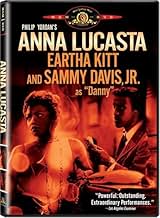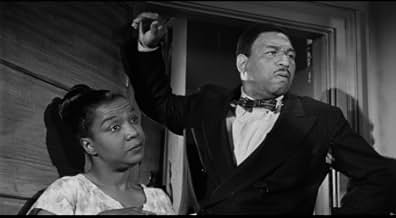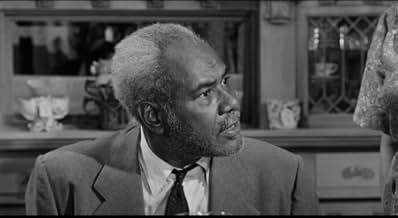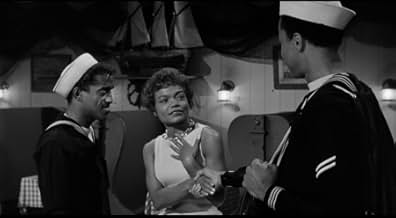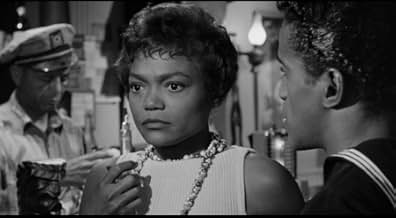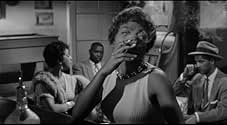A young woman struggling with a sordid past finds that her biggest enemy had larger demons than she did.A young woman struggling with a sordid past finds that her biggest enemy had larger demons than she did.A young woman struggling with a sordid past finds that her biggest enemy had larger demons than she did.
Rosetta LeNoire
- Stella
- (as Rosetta Le Noire)
Wallace Earl Laven
- Secretary
- (as Eileen Harley)
- Director
- Writer
- All cast & crew
- Production, box office & more at IMDbPro
6.8789
1
2
3
4
5
6
7
8
9
10
Featured reviews
Anna comes home
It took a long time for Philip Yordan's play Anna Lucasta to get made into a film and it turned out to be a good showcase for the talents of stars Eartha Kitt and Sammy Davis, Jr. The play ran on Broadway from 1944-46 and had 957 performances on Broadway. Several of the cast members in supporting roles returned for the screen. I'm sure that there were wartime references in the play that were cut out for the screen version as Sammy Davis, Jr.'s part was that of a sailor.
Sailor and general all around good time guy Davis's favorite call when in San Diego is Eartha Kitt in the title role. Some years earlier Kitt was caught getting down with some boy by her self righteous father and cast out of the home and drifted into prostitution.
But now her father Rex Ingram has come looking for her wanting her back. He thinks she will make a good wife for the son of an old friend from Alabama who has come to California. Henry Scott also has $4000.00 from his father and Anna's family who isn't the classiest bunch around also eyes him with that bankroll like an expensive cut of meat in a butcher shop.
She marries Scott, but Davis ain't finished. Soon enough Kitt has some real marital issues. Scott is a decent enough guy, but a bit naive as to the ways of the world, surprising for someone who wants a career teaching agricultural science like George Washington Carver.
As for Davis I think this role may have caught the eye of Otto Preminger who cast him in the very similar part of Sporting Life in Porgy And Bess the following year. Eartha Kitt shows off all her slinkiness that made her famous, but like Lena Horne Hollywood did not know what to do with her. I also think that she may have been a second choice behind Dorothy Dandridge good as Kitt is.
Anna Lucasta is a good film and a great chance to see Eartha Kitt and Sammy Davis, Jr. in their salad days.
Sailor and general all around good time guy Davis's favorite call when in San Diego is Eartha Kitt in the title role. Some years earlier Kitt was caught getting down with some boy by her self righteous father and cast out of the home and drifted into prostitution.
But now her father Rex Ingram has come looking for her wanting her back. He thinks she will make a good wife for the son of an old friend from Alabama who has come to California. Henry Scott also has $4000.00 from his father and Anna's family who isn't the classiest bunch around also eyes him with that bankroll like an expensive cut of meat in a butcher shop.
She marries Scott, but Davis ain't finished. Soon enough Kitt has some real marital issues. Scott is a decent enough guy, but a bit naive as to the ways of the world, surprising for someone who wants a career teaching agricultural science like George Washington Carver.
As for Davis I think this role may have caught the eye of Otto Preminger who cast him in the very similar part of Sporting Life in Porgy And Bess the following year. Eartha Kitt shows off all her slinkiness that made her famous, but like Lena Horne Hollywood did not know what to do with her. I also think that she may have been a second choice behind Dorothy Dandridge good as Kitt is.
Anna Lucasta is a good film and a great chance to see Eartha Kitt and Sammy Davis, Jr. in their salad days.
Sammy Davis Jr and Eartha Kitt in volcanic family eruptions.
When Sammy Davis Jr and Eattha Kitt act together it's dynamite and a feast for the professional cinéaste. But they are not alone. Equally prominent is Rex Ingram as the father in a completely wayward character that can't control himself, disoriented in life, lost in booze, all mixed up because of his beloved daughter, that he felt he had to banish from his life forever, without succeeding - he is the one who begs her to come back. This is a great play enacted with grim intensity and empathy concerning all the characters, including the mother, the suitor, the family and even the lower people at the joint. An important part is played by Elmer Bernstein's music, ingeniously illustrating the rapidly changing moods and trains of thoughts, also including a fabulous show scene with Sammy going solo - this is actually the apex of the film and story, a spectacular visualization of Anna's downfall and helplessness in the hands of the totally irresponsible Danny, who loves her none the less, but like everybody else, not even he can control his love or his feelings but drifts to the storms of his caprices. In fact, Anna, the fallen woman, adored and despised by them all, is the only one with a character, while the others are hopelessly and helplessly without. But what fabulous acting by these three main characters! This is truly a film to enjoy for a theater and drama gourmet. 9,5 would be my vote.
Catwoman in a quality film, 10 years earlier
Meowwwww... Eartha Kitt, ten years before she was Catwoman on "Batman"! This film not only co-stars Sammy Davis Jr, but that's also him singing the "Anna" theme. Things are pretty rough for Anna as the film opens. She's been tossed out by her family, even to the point of not have a place to sleep. But... just as things might be turning around for her, she runs into her old sailor friend, Danny, (Sammy Davis) and his pal Lester. Anna isn't sure if she likes either one of her options... her old sailor buddy that doesn't want to get married, or the "friend of the family" that is staying in town looking for work. Rudolph is played by Henry Scott, and it looks like this film is the only thing he ever did. and just when things are finally looking up for Anna, more people are running interference against her. Based on a play by Philip Yordan. He had just won the oscar for Broken Lance. "Anna" was first done by a white cast (1949), then later done by a black cast (1958). This is quite good, and i'm glad that Turner Classics is showing it. and now that I've seen THIS version, of course i want to see the 1949 Paulette Goddard version too. Highly recommended, if you can catch it.
This was a very good movie
This movie is frequently on a basic cable channel this month but I had seen the movie years ago.It still holds up.I think Eartha Kitt captured the personality of "Anna" completely and Sammy Davis Jr. did a good job in the role of "Danny." I felt like I was watching a stage play and I was never bored.Since it was practically unheard of for an all Black cast to do a film where the characters weren't all servants,slaves or criminals ,I enjoyed the actors being like actors in most movies.Some better than others etc."Rudolph" was the weakest role,"Stella ","Kathy".and "Stanley" barely had anything to do but "Frank" was spooky since he kept smiling all the time even when he was hitting and abusing "Mr. Lucasta."The previous poster was incorrect when he said "Rudolph" was the son of evil,shifty "Frank."He was the son of "Mr.Lucasta's" very religious friend from down south who wanted the "Lucastas" to find a wife for his farmer son."Frank" was "Stella's" husband and the son-in-law in the family.I would love to have this movie on VHS or DVD.Eartha Kitt was on TV today and she is still very pretty and youthful looking.Funny since the movie was black & white you can't tell that Miss Kitt is very light-skinned as was the mother,"Kathy",and "Stanley" and another prostitute.The actress playing "Stella" years later would play "Mother Winslow" on "Family Matters." I have never seen the version with Paulette Goddard playing Anna but I would like to just to compare the two movies.
Anna Lucasta
This features a powerhouse effort from Eartha Kitt in the title role. Ostracised from her family for her rather wild ways, she quickly falls into a life of easy money and virtue - eventually falling in with the savvy sailor "Danny" (Sammy Davis Jr.). The two have an on/off relationship to which he won't commit, so she keeps looking and meets the more respectable, would-be teacher, "Henry" (a rather underwhelming Rudolph Slocum) - who just happens to have $4,000. There might just be light at the end of her tunnel? Thing is, her drunken and rather cruel father "Joe" (Rex Ingram) is still determined to wreck things for his daughter - and even now married, things are still pretty messy and there looks like there is little scope for any redemption of that relationship. The story itself is really little more than a familiar family melodrama with a strong supporting cast. What makes this stand out is the chemistry between Davis and Kitt with the latter oozing charisma, even if her character isn't the most pleasant to hit the silver screen. There's some entertaining music and dance and some lovely cartoons right at the end and though probably not the greatest of stories, it is worth watching for the two at the top of the bill.
Did you know
- TriviaOriginally a play written by Philip Yordan, portraying a Polish-American family, it was rewritten by American Negro Theater Director Abram Hill and director Henry Wagstaff Gribble for an all-African American cast.
- GoofsWhen Joe dies, his head drops to the right. When shown from another angle, he is facing left.
- ConnectionsVersion of Anna Lucasta (1949)
- How long is Anna Lucasta?Powered by Alexa
Details
- Runtime
- 1h 37m(97 min)
- Color
- Aspect ratio
- 1.66 : 1
Contribute to this page
Suggest an edit or add missing content


